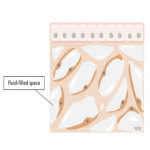Definition
noun
Any from a class of glycoproteins that form the collagenous (white) fibers, especially those that occur in the extracellular matrix of connective tissues
Supplement
Collagen is a biomolecule (particularly, glycoprotein) that forms the collagenous fiber. A collagenous fiber is one of the three major types of fibers that occur in connective tissues; the others are elastic fibers and reticular fibers. The collagenous fibers are typically arranged in branching bundles of indefinite length. They are strong insoluble fibers.
Since collagen fiber is the most predominant type of connective tissue fibers, collagen molecules are regarded as the most abundant protein in mammals. They occur in skin, tendon, ligaments, bone, cartilage, etc. Collagen is produced typically by fibroblasts. Collagen, when boiled, is converted into gelatin. Thus, it is used in food and industry to produce gelatin by irreversibly hydrolyzing it.
A collagen is made up of tropocollagen. A tropocollagen, in turn, is made up of three polypeptide strands (referred to as alpha peptides) that are twisted together into a super helix or a right-handed triple helix. The amino acids in each chain are arranged in a regular pattern. The typical pattern is Gly-Pro-X or Gly-X-Hyp (the X being any other amino acid residue). An aggregate of tropocollagen is referred to as a collagen fibril.
Collagens may be grouped based on the structure they form: fibrillar or non-fibrillar. The most common types of collagens are type I collagen, type II collagen, type III collagen, type IV collagen, and type V collagen. Among these types, only type IV collagen is nonfibrillar.
Word origin: Greek kolla (“glue”) + gennan (“to produce”)
See also:
Related term(s):
Related form(s):
- collagenous (adjective of, pertaining to collagen, forming or producing collagen)



